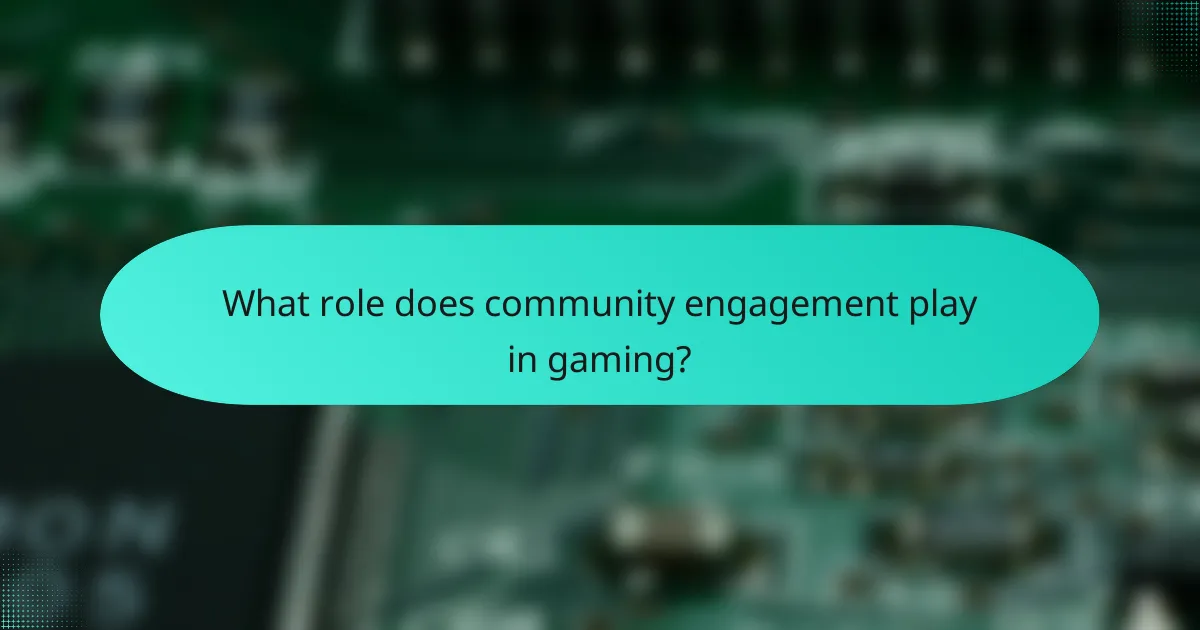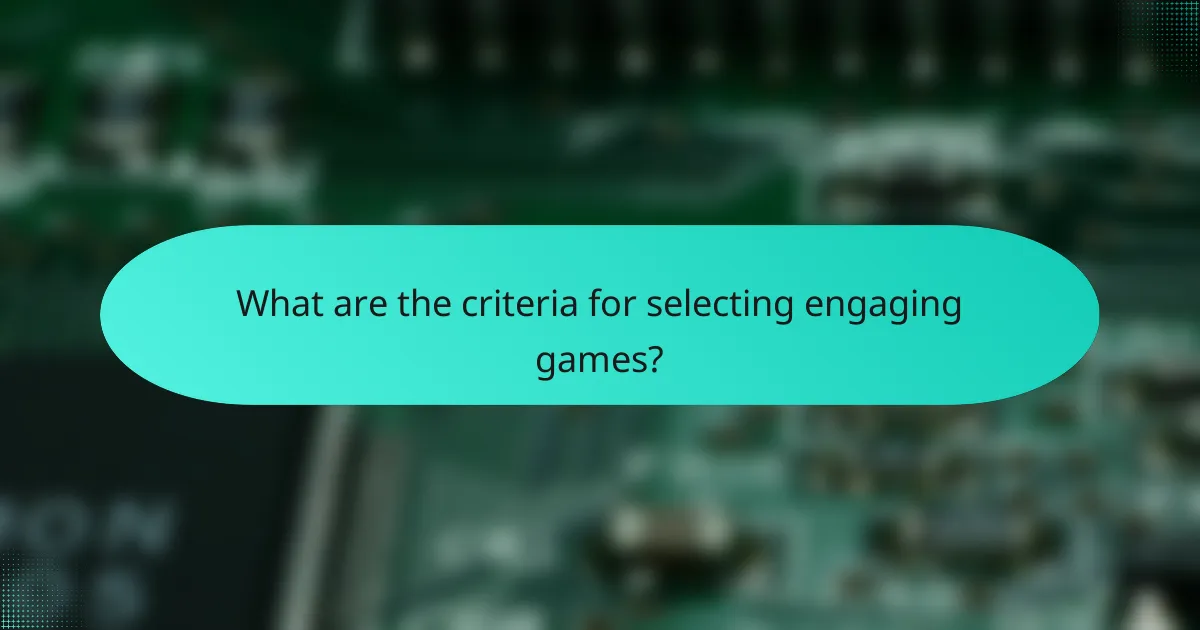Games provide immense entertainment value by creating immersive experiences that draw players in and motivate them to return. This engagement is bolstered by strong community connections, which enhance gameplay and foster lasting relationships among players. Additionally, the element of replayability ensures that gamers continually find new challenges and experiences, further enriching their enjoyment and investment in the game.

How do games provide entertainment value?
Games deliver entertainment value through engaging experiences that captivate players and encourage repeated play. This value stems from various elements such as storytelling, visual appeal, interactivity, and community involvement.
Engaging narratives
Engaging narratives are central to many games, drawing players into rich stories that evoke emotions and investment. These narratives can range from epic quests in fantasy settings to personal stories in indie titles, allowing players to connect deeply with characters and plotlines.
Well-crafted narratives often include branching choices, which enhance replayability as players explore different outcomes. Games like “The Witcher” series exemplify how storytelling can elevate the overall experience.
Immersive graphics
Immersive graphics significantly enhance the entertainment value of games by creating visually stunning environments that captivate players. High-quality graphics can transport players to fantastical worlds, making the gaming experience more engaging and memorable.
Modern games often utilize advanced technologies such as ray tracing and high-resolution textures to create lifelike visuals. Titles like “Cyberpunk 2077” showcase how immersive graphics can draw players into a believable universe.
Interactive gameplay
Interactive gameplay is a key factor in maintaining player interest and providing entertainment value. Games that allow players to make choices, solve puzzles, or engage in combat create a dynamic experience that keeps players invested.
Mechanics such as skill trees, crafting systems, and multiplayer modes can enhance interactivity. For example, games like “Minecraft” encourage creativity and exploration, leading to endless possibilities for player engagement.
Variety of genres
The variety of genres available in gaming allows players to find experiences that suit their preferences, enhancing entertainment value. From action and adventure to simulation and role-playing, there is a genre for nearly every type of player.
This diversity means that players can switch between genres based on their mood or interests, keeping the gaming experience fresh. Popular genres like battle royale and puzzle games attract different audiences, contributing to the overall appeal of gaming.
Social interaction
Social interaction in games fosters community engagement and enhances entertainment value. Multiplayer games allow players to connect with friends or meet new people, creating shared experiences that can be both fun and rewarding.
Features like voice chat, cooperative missions, and competitive play encourage collaboration and competition, making games more enjoyable. Titles like “Fortnite” and “Among Us” highlight how social dynamics can significantly enhance the gaming experience.

What role does community engagement play in gaming?
Community engagement is crucial in gaming as it fosters connections among players, enhances the overall experience, and increases the game’s longevity. A vibrant community can lead to improved game content, increased player retention, and a more enjoyable environment for everyone involved.
Online multiplayer experiences
Online multiplayer experiences are a cornerstone of community engagement in gaming. They allow players to connect, collaborate, and compete with others from around the world, creating a shared environment that enhances enjoyment. Games like “Fortnite” and “Call of Duty” thrive on these interactions, with players forming teams and friendships that extend beyond the game itself.
When participating in multiplayer games, consider joining clans or guilds to deepen your engagement. These groups often provide support, organize events, and foster a sense of belonging, which can significantly enhance your gaming experience.
Fan-created content
Fan-created content, such as mods, fan art, and custom levels, plays a significant role in community engagement. This content not only showcases players’ creativity but also enriches the gaming experience by introducing new elements and perspectives. Games like “Minecraft” and “Skyrim” have extensive modding communities that contribute to their ongoing popularity.
Encouraging fan-created content can be beneficial for developers as well. By providing tools and platforms for players to share their creations, developers can keep the community active and invested in the game over time.
Game events and tournaments
Game events and tournaments are vital for fostering community engagement, as they bring players together for competitive play and social interaction. These events can range from local gatherings to large-scale international competitions, offering players a chance to showcase their skills and connect with others who share their passion.
Participating in or organizing events can enhance your gaming experience. Look for local gaming meetups or online tournaments that align with your interests, as these can provide valuable networking opportunities and a deeper sense of community.
Social media interactions
Social media interactions significantly contribute to community engagement by allowing players to share experiences, discuss strategies, and connect with developers. Platforms like Twitter, Discord, and Reddit serve as hubs for player discussions, updates, and feedback, creating a dynamic dialogue between the community and game creators.
To maximize your engagement, follow game developers and join relevant social media groups. Engaging in discussions and sharing your gameplay experiences can help you build connections and stay informed about the latest updates and community events.

How does replayability affect game longevity?
Replayability significantly enhances game longevity by encouraging players to return for new experiences. Games that offer varied content, choices, and challenges keep players engaged over time, extending their overall enjoyment and investment.
Dynamic content updates
Dynamic content updates, such as seasonal events or new missions, can refresh a game and attract players back. These updates often introduce new gameplay mechanics, storylines, or rewards that keep the experience exciting. For example, a game might add a holiday-themed event that offers exclusive items, enticing players to log in regularly.
Multiple endings
Games with multiple endings provide players with different outcomes based on their choices, enhancing replayability. This encourages players to explore various paths and decisions to see how the story unfolds differently. A game that features several endings can lead to discussions within the community, further engaging players.
Player choice impact
When player choices significantly impact gameplay, it increases the desire to replay a game. Players may want to experiment with different strategies or character builds to see how these choices affect the game world. For instance, a role-playing game that allows players to align with different factions can lead to unique experiences on subsequent playthroughs.
Achievements and challenges
Achievements and challenges can motivate players to replay a game to complete all objectives. These can range from simple tasks to complex challenges that require skill and strategy. Implementing a tiered achievement system encourages players to improve their skills and explore all aspects of the game, enhancing its longevity.

What are the criteria for selecting engaging games?
Engaging games are typically selected based on player reviews, developer reputation, and the effectiveness of game mechanics and design. These criteria help ensure that a game offers entertainment value, fosters community engagement, and provides replayability.
Player reviews and ratings
Player reviews and ratings serve as a crucial indicator of a game’s quality and engagement level. High ratings often suggest that players find the game enjoyable and worth their time, while low ratings may signal potential issues. Checking platforms like Steam, Metacritic, or user forums can provide insights into player experiences.
When evaluating reviews, consider both the quantity and quality of feedback. A game with thousands of positive reviews is generally more reliable than one with only a handful of ratings. Look for common themes in reviews, such as gameplay mechanics or community features, to gauge overall satisfaction.
Developer reputation
The reputation of a game developer can significantly influence the perceived quality of their games. Established developers with a history of successful titles are often trusted to deliver engaging experiences. Researching a developer’s past projects can reveal their commitment to quality and innovation.
Additionally, consider the developer’s engagement with their community. Developers who actively respond to player feedback and provide updates are more likely to create games that resonate with their audience. Following developer blogs or social media can keep you informed about their practices and upcoming releases.
Game mechanics and design
Game mechanics and design are fundamental to a game’s engagement level. Well-designed mechanics should be intuitive and provide a balance of challenge and reward, keeping players invested. Look for games that offer diverse gameplay options, such as cooperative modes or competitive features, to enhance replayability.
Consider the visual and auditory design as well. Aesthetically pleasing graphics and immersive soundtracks can elevate the overall experience. When selecting a game, pay attention to how these elements contribute to the game’s atmosphere and player enjoyment.
